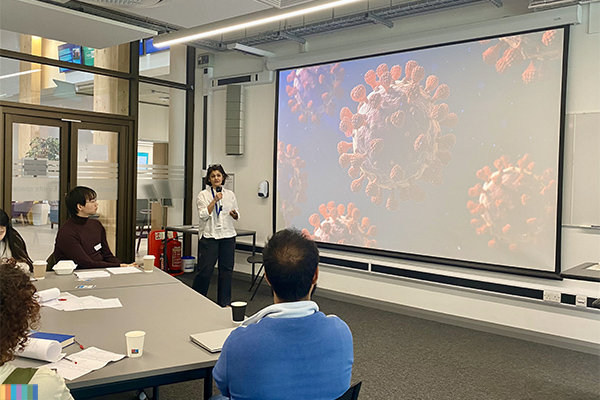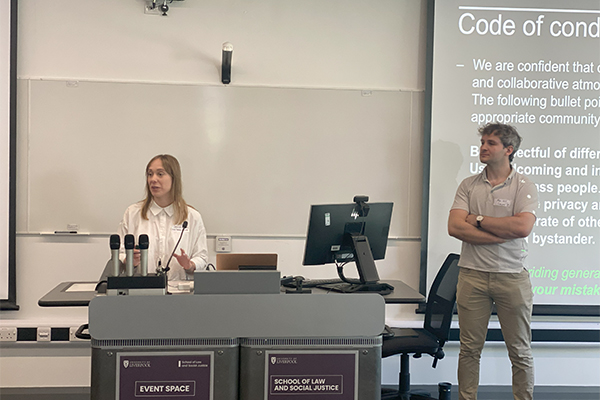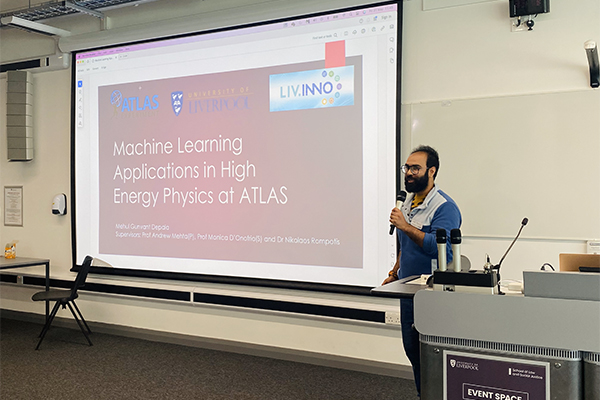Alan Turing Institute brings PhD researchers together in Liverpool

In an era where data science and artificial intelligence are rapidly evolving, collaboration among researchers and knowledge sharing of the latest advancements in different fields has become increasingly crucial. To facilitate this, the Alan Turing Institute hosts a regular series of PhD Student Presentation and Networking events, which showcase cutting-edge research in data intensive science and AI, and also foster connections that could shape the future of these fields.

Introduction by Turing representative Denise Bianco and lead local organiser Dr Alexander Hill.
In May, the University of Liverpool hosted an event in the series, welcoming PhD students in data intensive science and AI from universities from across the UK. The local organising committee saw significant cross-departmental collaboration between LIV.INNO and the Distributed Algorithms CDT, among others.
This event provided students with the opportunity to present their research via talks and posters, and to network with their peers, forging connections that will support them in their future careers.
Following an introduction from Turing representative Denise Bianco and lead local organiser Dr Alexander Hill, the Liverpool event had a packed itinerary, including group icebreaker and share-out activities, almost a dozen short talks on research, and a poster exhibition area.

LIV.INNO student Mehul Depala giving a presentation.
Among the day’s speakers was LIV.INNO student Mehul Depala, who spoke on machine learning applications in High Energy Physics at the ATLAS experiment. Providing a welcome context for discussion on the ethical implications of AI, Shi Yun Ng of Manchester Metropolitan University discussed her contribution to the development of a fair framework for responsibility and accountability in data-driven and AI systems.
A keynote presentation from Professor Reecha Sofat and LIV.DAT student Andrew Mason reflected on the challenges in unifying multimodal healthcare data across trusts and patient lifetimes, and the differences and synergies that such research has with a data science-focussed PhD, in this case in the field of astrophysics.
The presentation of physical posters was augmented by the creation of a bespoke virtual environment, which enabled attendees to promote their work and the event through social media channels.
This platform, kindly created by 4wardFutures, may be accessed here: 4fvirtual.org.uk/alan-turing-Liverpool .
Feedback following the event was overwhelmingly positive. One attendee commented that the day was a “Very productive and purposeful event. It was refreshing for me to see a cohort of PhD around me, as you normally work lonely as a PhD student. The dedication of the organisers was amazing!”, while another said “This was a really fun event, and the diversity of research topics really made the day for me”.
The success of the Alan Turing Institute PhD Student Presentation and Networking Day at the University of Liverpool underscores the vital role such events play in the academic ecosystem. By bringing together diverse minds from across the UK, this event not only facilitated knowledge exchange but also laid the groundwork for future collaborations. As data science and AI continue to shape our world, these interdisciplinary connections among early-career researchers promise to drive innovation and tackle complex challenges. The overwhelmingly positive feedback from attendees reinforces the need for more such opportunities, ensuring that the next generation of data scientists and AI researchers are well-equipped to push the boundaries of their fields.